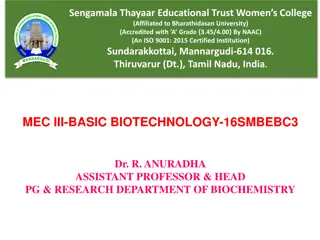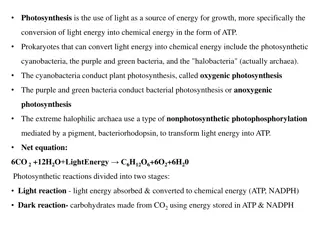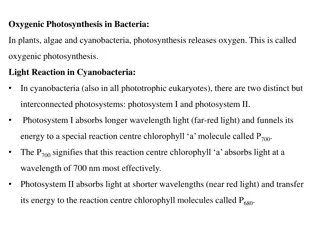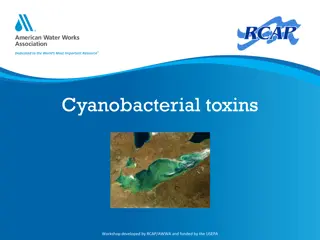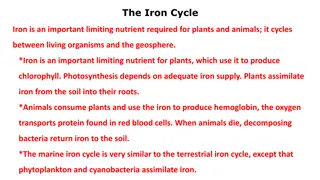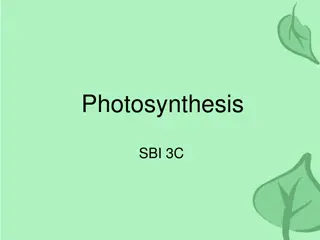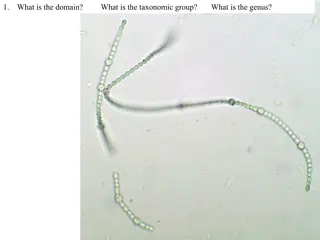Understanding Nitrogen Fixation Process in Plants
Nitrogen fixation is the conversion of atmospheric nitrogen into ammonia or nitrates by bacteria or industrial processes for plant absorption. Biological and abiological methods exist, with various bacteria and cyanobacteria involved in the process. Symbiotic relationships between these organisms an
1 views • 10 slides
Understanding Blue-Green Algae: Cultivation, Nutrient Composition, and Properties
Blue-green algae, also known as cyanobacteria, are photosynthetic bacteria that thrive in warm, nutrient-rich water bodies. They are packed with essential nutrients like vitamins, minerals, and amino acids, making them a valuable resource for overall health. Learn about the cultivation, uses, and hi
1 views • 21 slides
Understanding Bacterial Photosynthesis: Types and Processes
Photosynthesis is the conversion of light energy into chemical energy, crucial for growth and production of ATP. Prokaryotes such as cyanobacteria, purple and green bacteria, and halobacteria demonstrate different forms of photosynthesis. Oxygenic photosynthesis, found in cyanobacteria, releases oxy
2 views • 20 slides
Understanding Photosynthesis in Bacteria and Cyanobacteria
Oxygenic photosynthesis in plants, algae, and cyanobacteria releases oxygen. Cyanobacteria utilize photosystems I and II in their light reactions, with distinct roles in light absorption and electron transfer. Cyclic photophosphorylation involves only photosystem I, while non-cyclic photophosphoryla
0 views • 10 slides
Understanding Cyanobacterial Toxins Workshop
Explore the comprehensive workshop developed by RCAP/AWWA and funded by the USEPA on cyanobacterial toxins. Learn about the basics of cyanobacteria toxins, understanding when and why they occur, taking necessary actions, and limiting exposure. Delve into topics such as terminology, harmful algal blo
0 views • 49 slides
The Iron Cycle and Aquatic Microbiology
Iron plays a crucial role in terrestrial and marine ecosystems, cycling between living organisms and the geosphere. It is a vital nutrient for plants, essential for chlorophyll production, and for animals, needed to create hemoglobin. The marine iron cycle involves phytoplankton and cyanobacteria as
0 views • 19 slides
Evolution and Classification of Plants
Exploring the evolutionary history of plants, from cyanobacteria to modern-day magnolias. Learn about endosymbiosis, plant classification, major plant lineages, and examples of different plant types such as nonvascular and vascular plants. Delve into the intricate features that define various plant
0 views • 20 slides
Understanding Bacteria: General Characteristics and Economic Importance
Bacteria are ubiquitous microorganisms found in various environments, with some living as commensals or symbionts while others causing diseases. They are characterized by their small size, absence of a nucleus, and diverse classifications such as prokaryotes, eukaryotes, cyanobacteria, and archaebac
0 views • 15 slides
Understanding Photosynthesis: The Process of Energy Conversion in Plants
Photosynthesis is a vital process where plants, algae, and cyanobacteria convert light energy from the sun into chemical energy in the form of glucose. This energy conversion involves the absorption of light by chlorophyll molecules in chloroplasts, leading to the generation of ATP and the formation
0 views • 12 slides
Mechanisms of Carbon Concentration in Plants: Biochemical and Biophysical Variants
Biochemical and biophysical mechanisms of carbon concentration in plants involve variations such as C4 and CAM pathways in higher plants, as well as specific adaptations in algae and cyanobacteria. These mechanisms play a crucial role in efficiently managing carbon fixation processes in different ty
0 views • 6 slides
Taxonomic Classification of Anabaena Genus and Heterocyst Cell Function
The domain of Bacteria comprises the taxonomic group Cyanobacteria, with the genus Anabaena belonging to this group. An important cell within Anabaena is the heterocyst, which serves specific functions within the organism.
0 views • 168 slides
Exploring Prokaryotes and Earth's Ancient Life Forms
Uncover the fascinating world of prokaryotes - the earliest inhabitants of Earth dating back billions of years. From microbial mats to stromatolites, delve into the history of life on our planet and the evolution of the atmosphere. Discover how cyanobacteria played a pivotal role in oxygenating the
0 views • 31 slides

